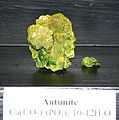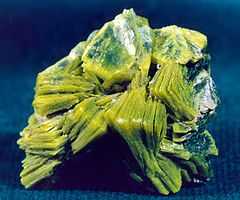Autunite
| Autunite | |
|---|---|
|
Autunite | |
| General | |
| Category | Phosphate minerals |
| Formula (repeating unit) | Ca(UO2)2(PO4)2·10-12H2O |
| Strunz classification | 08.EB.05 |
| Crystal symmetry |
Orthorhombic dipyramidal H-M symbol: (2/m 2/m 2/m) Space group: Pnma |
| Unit cell | a = 14.0135(6) Å, b = 20.7121(8) Å, c = 6.9959(3) Å; Z=4 |
| Identification | |
| Formula mass | 986.26 |
| Color | Lemon-yellow to sulfur-yellow, greenish yellow to pale green; may be dark green to greenish black |
| Crystal habit | Tabular crystals, foliated or scaly aggregates, and in crusts |
| Crystal system | Orthorhombic |
| Twinning | Rare on {110} |
| Cleavage | {001} perfect, {100} and {010} poor |
| Fracture | uneven |
| Mohs scale hardness | 2-2.5 |
| Luster | Vitreous - pearly |
| Streak | Pale yellow |
| Diaphaneity | Transparent to translucent |
| Specific gravity | 3.1-3.2 |
| Density | 3.15 |
| Optical properties | Biaxial (-) |
| Refractive index | nα = 1.553 - 1.555 nβ = 1.575 nγ = 1.577 - 1.578 |
| Birefringence | δ = 0.003 |
| Pleochroism | X = colorless to pale yellow; Y = Z = yellow to dark yellow |
| 2V angle | Measured: 10° to 53° |
| Ultraviolet fluorescence | Strong yellow-green fluorescence in UV; Radioactive |
| Solubility | Soluble in acids |
| Alters to | Dehydrates in air |
| Other characteristics | Pseudotetragonal for synthetic material |
| References | [1][2] |
Autunite (hydrated calcium uranyl phosphate) with formula: Ca(UO2)2(PO4)2·10-12H2O is a yellow - greenish fluorescent mineral with a hardness of 2 - 2½. Autunite crystallizes in the orthorhombic system and often occurs as tabular square crystals. Due to the moderate uranium content of 48.27% it is radioactive and also used as uranium ore. If the mineral dries out, it converts to meta-autunite-I, which can turn into meta-autunite-II after heating. These two subsequent minerals are very rare in nature. For scientific studies it is recommended to store the mineral in a sealed container to minimize the water loss. Museums are known to have covered the mineral with lacquer to avoid drying of the mineral.
Autunite was discovered in 1852 near Autun, France. It occurs as an oxidation product of uranium minerals in granite pegmatites and hydrothermal deposits. Associate minerals include metaautunite, torbernite, phosphuranylite, saleeite, uranophane and sabugalite.[2]
Mining
Some autunite is found near Mount Spokane, Washington. 90,000 lbs of U3O8 were produced from nine properties, although most of the ore came from the Daybreak Mine.[3]
Gallery
-
_France.jpg)
Autunite under UV light
-

Scaly Crystals of the secondary uranium phosphate mineral autunite
References
| Wikimedia Commons has media related to Autunite. |
| Wikisource has the text of the 1911 Encyclopædia Britannica article Autunite. |
